
Marketing of self-care products and personal care brands
The self-care products market has blossomed into a vibrant industry, sprouting from the seeds of time-honored rituals into a flourishing garden of modern commodities. Historically, self-care was an intimate, homely affair, often using nature’s bounty in the form of herbs, oils, and concoctions. Today, it has transformed into a sophisticated industry worth billions.

The sector is projected to reach $49.9 billion by 2027, reflecting a compound annual growth rate (CAGR) of 5.9% from 2020. This robust growth is driven by a societal shift towards wellness, with consumers seeking products to enhance their personal wellbeing.
From luxuriant bath salts to revitalizing facial scrubs, diversity and innovation define the product offerings in this industry. The market accommodates varied consumer needs, transforming mundane personal care into delightful self-indulgence.
Another important dimension is sustainability. The modern consumer values not only the benefits a product provides but also its environmental impact. This green mindset has fostered a market where self-care and sustainability are intertwined.
Social media also plays a crucial role, serving as a digital marketplace filled with self-care routines, product endorsements, and reviews. Brands successfully riding this digital wave have become integral to the consumers’ self-care regimen.
The self-care products industry today paints a dynamic picture, being both a reflection and catalyst of evolving consumer attitudes. Marketing of self care products has become a promising venture, selling a lifestyle and an experience of self-enhancement.
In the upcoming articles, we will delve deeper into this compelling market, exploring the trends, the psychology of the self-care consumer, and the innovative brands making waves. Understanding the rich landscape of the self-care products market is our first step in navigating its captivating realm.
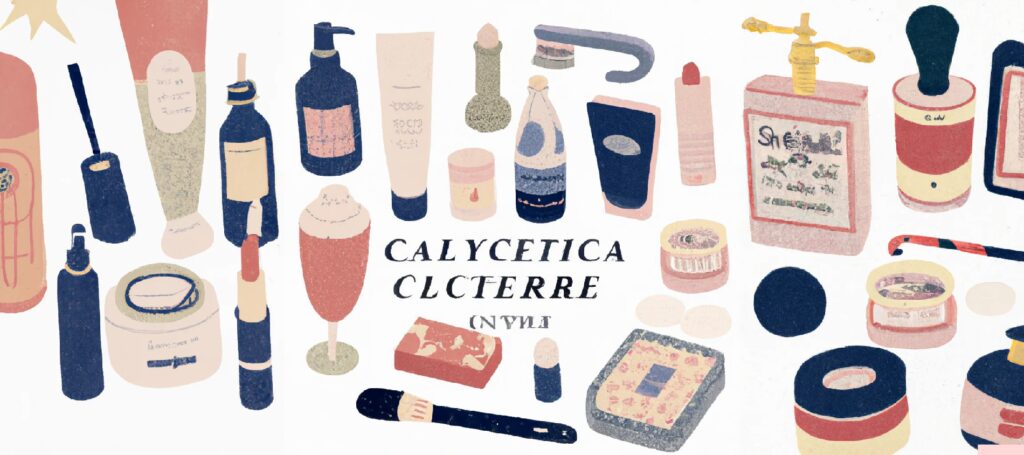
Trends in the self care product industry
The self-care industry, much like an elegant dance, is constantly in motion. The choreography of this market adjusts to the rhythm of societal changes and consumer preferences, unveiling fresh trends with each turn. Today, we put on our dancing shoes and delve into the dance floor of the self-care trends that are shaping the industry.
1. Personalization: The Tailored Touch
In the symphony of self-care, consumers increasingly desire a melody that’s composed just for them. Personalization in personal care products has taken center stage, with companies offering tailor-made solutions based on an individual’s unique needs and preferences. Brands offering bespoke products, from customized skincare regimens to personalized hair care, are resonating with consumers seeking a more tailored approach to self-care.
2. Sustainable Self-Care: Embracing the Green Routine
Consumers are not only incorporating self-care into their lifestyles but also sustainability. The trend towards eco-friendly personal care products is thriving, with brands offering cruelty-free formulations, refillable packaging, and ethically sourced ingredients. As consumers seek to reduce their environmental footprint, the marriage of self-care with sustainability is proving to be a harmonious union.
Tech Touch: The Digital Embrace
The fusion of technology and self-care is an enthralling dance of innovation. From AI-powered skin analysis tools to smart toothbrushes that monitor dental health, technology is reinventing the self-care routine. The rise of beauty tech signifies the evolving face of the self-care industry, bridging the gap between personal care and cutting-edge technology.
Mindful Care: Beyond the Physical
Self-care is extending beyond physical wellness to encompass mental well-being. Products that promote relaxation and mental clarity, like scented candles and essential oils, are gaining popularity. Even personal care rituals are being viewed as opportunities for mindfulness and meditation, shifting the perception of self-care from a routine task to a therapeutic process.
The Social Media Effect: Influence in the Digital Age
Social media is a vibrant dance floor where trends take shape. Influencers showcasing their self-care routines, viral product reviews, and DIY beauty hacks have a profound impact on consumer choices. Brands leveraging these platforms effectively are not only surviving but thriving in the competitive self-care industry.
The self-care industry, much like a rhythmic dance, is ever-evolving, mirroring societal changes and individual needs. To succeed in the art of marketing self-care products, it’s essential to understand and align with these trends. Only then can one truly master the dance of this dynamic market.
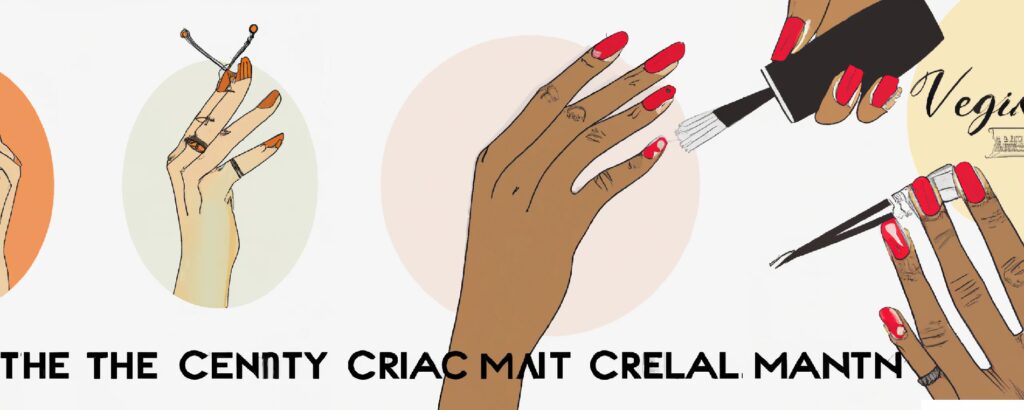
Interesting self care products facts
The world of self-care products, much like an enchanting novel, is full of captivating narratives and surprising plot twists. To add more layers to our understanding of this industry, let’s delve into five intriguing and less-known facts about the self-care market.
1. The Power of Scents
The olfactory appeal of a product plays a significant role in its success. Studies reveal that pleasant fragrances not only elevate mood but also enhance perception of a product’s effectiveness. Hence, brands often invest heavily in developing appealing fragrances for their products, knowing that a captivating scent can transform a simple body lotion or hair serum into a sensory delight.
2. Rising Star: Men’s Grooming
The narrative of self-care is no longer confined to the female demographic. The men’s grooming industry is experiencing a swift rise, predicted to reach $81.2 billion by 2024. Brands are launching dedicated lines of products for men, underscoring the expanding inclusivity of the self-care narrative.
3. The Korean Influence
The influence of Korean beauty standards, often referred to as “K-beauty”, on the global self-care market is undeniable. Known for their innovative formulations and elaborate skincare routines, Korean brands have transformed global beauty perceptions. The worldwide K-beauty products market is projected to reach $21.8 billion by 2026.
4. Green is the New Black
The trend towards natural and organic personal care products is not just a fad, but a shift in consumer values. The global organic personal care market size is expected to reach $25.1 billion by 2025, underlining the growing consumer demand for clean and green self-care products.
5. Digital Shopping: The New Norm
The advent of e-commerce has reshaped the self-care market. Online shopping for personal care products has surged, with digital sales accounting for nearly 10% of all beauty and personal care sales. Brands are enhancing their digital presence, recognising the potential of online platforms in influencing consumer choices.
The self-care industry, much like a riveting book, is a tale of trends, innovation, and evolving consumer preferences. As we flip through its pages, we gain a deeper understanding of its dynamism and potential. As we continue our journey into the world of self-care, we will delve into the psychology of the self-care consumer and spotlight innovative brands that are leaving a mark in this exciting industry.

Decoding the Self-Care Shopper: Psychology Behind the Purchase
Buying self-care products is more than just a transaction; it’s a testament to the growing mindfulness towards personal wellbeing. The consumer, like an avid explorer, embarks on a journey of self-discovery and nurturing with each purchase. Today, we turn our gaze towards the psychology driving these decisions, providing a window into the minds of self-care shoppers.
1. The Pursuit of Happiness
At the heart of every purchase in the self-care industry lies a simple, universal quest – the pursuit of happiness. Be it a luxurious bath bomb or a skin-nourishing face mask, these products offer a piece of joy, a moment of self-indulgence. Brands that can create and associate their products with such happy moments often find a place in consumers’ hearts and shopping carts.
2. The Wellness Wave
A growing awareness of the importance of holistic wellbeing is driving consumers to embrace the wellness wave. Self-care purchases are no longer viewed as extravagant, but rather as essential investments in one’s health and wellness. Products that can successfully communicate this wellness proposition are more likely to resonate with today’s self-care shopper.
3. The Personal Palette
Every individual is unique, and so are their self-care needs. The modern consumer seeks products that are tailored to their specific needs, be it a moisturizer for sensitive skin or a toothpaste for gum health. Brands that offer customization and cater to individual needs can tap into this personal palette of preferences.
4. The Green Goddess
With growing environmental consciousness, the consumer is often driven by the desire to make eco-friendly choices. Brands that offer sustainable self-care products align with this green goddess persona, appealing to the shopper’s desire to nurture both self and the environment.
5. The Influencer Impact
In the age of social media, influencers hold a significant sway over consumer choices. A positive review or a personal recommendation from a trusted influencer can drive consumers to explore and purchase self-care products.
Understanding the psychology behind self-care purchases provides valuable insights into the dynamics of this market.
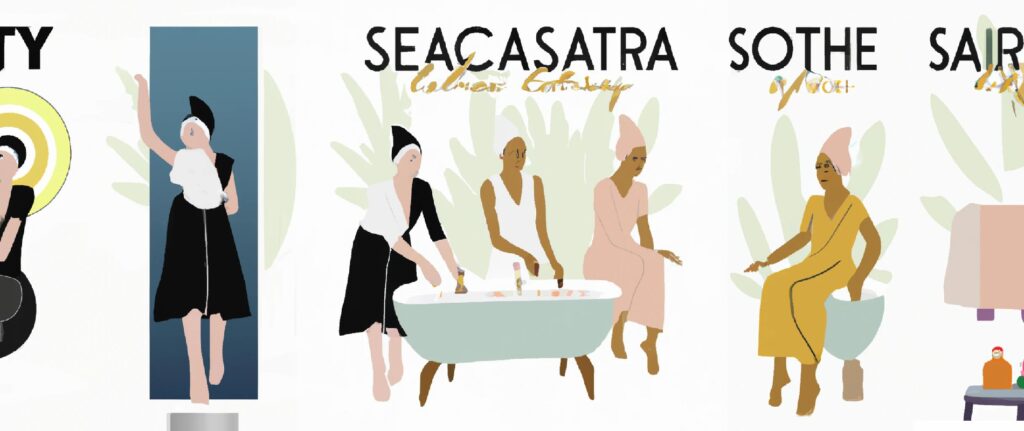
Faces of Self-Care: Unveiling the Buyer Personas
The world of self-care, much like a bustling city, is populated with diverse individuals each with their unique preferences and motivations. By understanding these different personas, brands can tailor their marketing strategies to resonate with their target audiences. Let’s take a stroll through this city and meet some of its inhabitants.
1. Wellness Warrior
The Wellness Warrior is deeply invested in their personal health and wellbeing. They see self-care products as more than a luxury; they’re an essential part of their wellness regimen. Brands that offer products promoting holistic health, like green tea extracts or yoga accessories, are likely to catch this persona’s eye.
2. Green Guru
The Green Guru prioritizes eco-friendly choices. They gravitate towards brands that embody sustainability in their product offerings, from organic ingredients to recyclable packaging. A brand touting its commitment to the environment can easily win the heart of this eco-conscious shopper.
3. Trendsetter Tina
Always on the pulse of the latest trends, Trendsetter Tina seeks to stay ahead of the curve. She’s constantly on the lookout for the next big thing in self-care, whether it’s a viral face mask or a game-changing hair care gadget. Brands that consistently innovate and keep up with the latest trends can engage this persona.
4. Practical Peter
Practical Peter values functionality and convenience. He prefers products that offer multiple benefits and fit seamlessly into his busy schedule. Time-saving products like 2-in-1 shampoo and conditioners or ready-to-use face masks are likely to find a place in his shopping cart.
5. Digital Diva
The Digital Diva does most of her shopping online. She is influenced by online reviews, social media influencers, and digital marketing. Brands that maintain a strong digital presence and leverage online platforms effectively can capture the attention of this digital savvy shopper.
By understanding these buyer personas, brands can effectively tailor their marketing of self-care products to resonate with their target audience. As we continue to navigate the captivating world of self-care, we will be spotlighting innovative brands that are making waves in this space in our next article.
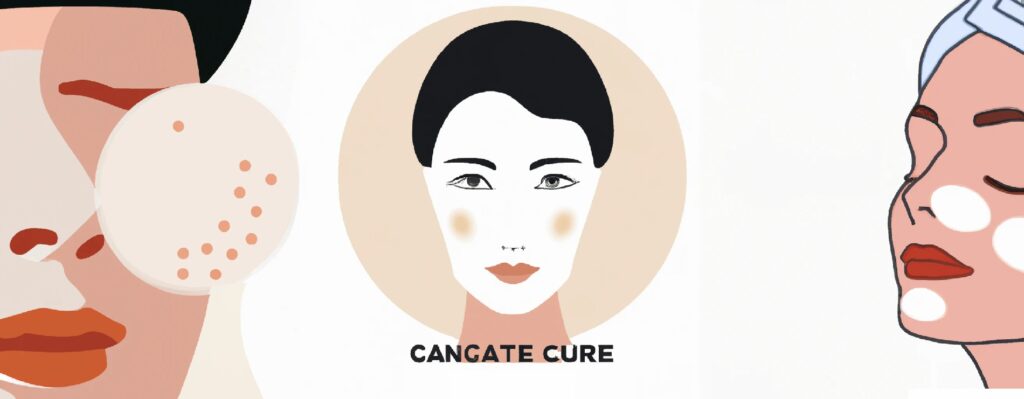
Leading the Self-Care Revolution: Five Innovative Brands to Watch
Navigating the self-care market landscape, we encounter several innovative brands that stand out. With their unique product offerings and insightful marketing strategies, they are at the forefront of the self-care narrative. Here, we spotlight five such trailblazing brands.
1. Glossier
Glossier, birthed from the digital world, has expertly leveraged the power of online marketing to create a community around its skincare and makeup products. Their products, from the skin-nourishing ‘Super Bounce’ serum to the complexion-perfecting ‘Perfecting Skin Tint’, are designed to celebrate realness in beauty, appealing to the Digital Diva.
2. Lush
Lush Cosmetics is a beacon of sustainability in the self-care market. Known for their bath bombs, ‘Dream Cream’ body lotion, ‘Angels on Bare Skin’ facial cleanser, and ‘Honey I Washed My Hair’ shampoo bar, all packaged in minimal, recyclable materials, Lush’s ethos aligns with the Green Guru’s eco-conscious values.
3. Ziaja
Ziaja, a Polish cosmetics company, brings a holistic approach to skincare with its nature-inspired products. The brand’s offerings, such as the goat’s milk moisturizing day cream, olive leaf gel scrub, and jasmine anti-wrinkle cream, cater to the Wellness Warrior’s diverse self-care needs.
4. Harry’s
Harry’s is altering perceptions of self-care among men. Their ‘Winston’ razor, post-shave balm, and face lotion stand testament to their commitment to high-quality, affordable shaving products. This direct-to-consumer brand speaks to Practical Peter’s preference for function and convenience.
5. The Ordinary
The Ordinary has disrupted the skincare market with its simplicity, transparency, and affordability. With offerings like ‘Hyaluronic Acid 2% + B5’, ‘Niacinamide 10% + Zinc 1%’, and ‘100% Organic Cold-Pressed Rose Hip Seed Oil’, the brand allows consumers to tailor their skincare routine to their specific needs, appealing to Trendsetter Tina.
Each of these brands is crafting its own unique path in the self-care revolution, offering key insights into successful marketing of self-care products, a testament to the power of understanding and catering to diverse consumer preferences.
Title: Decoding Success: Effective Marketing Strategies for Self-Care Products
In the diverse cityscape of self-care, navigating the marketplace and creating a successful brand can seem as complex as mapping an intricate metropolis. However, much like city planners who strategically design efficient and attractive urban spaces, marketers can craft successful strategies to navigate the self-care market.
1. Harnessing the Power of Digital Marketing: Glossier’s Success
Digital marketing has become the backbone of modern business strategies, and Glossier, a digitally native beauty brand, has adeptly utilized this to their advantage. From their beginnings on social media platform Instagram, Glossier constructed an online community where customers felt heard, appreciated, and represented. Leveraging user-generated content and influencer marketing, the brand has created a two-way dialogue with consumers, providing a personalized experience and fostering brand loyalty. They have shown that digital marketing is not about a hard sell, but about building a relationship.
2. Sustainable Marketing: Lush’s Green Strategy
In an age where eco-consciousness is not just a trend, but a lifestyle, Lush Cosmetics has demonstrated the power of sustainable marketing. Their commitment to ethically sourced ingredients, minimal packaging, and against animal testing resonate with consumers who seek responsible and ethical products. By integrating sustainability into its core brand values, Lush has built a strong brand image that aligns with consumers’ environmental concerns. Their marketing is not just about promoting products but promoting a sustainable lifestyle.
3. Understanding Customer Needs: Ziaja’s Customer-centric Approach
At the heart of every successful marketing strategy is a thorough understanding of the customer. Ziaja exemplifies this with its extensive range of products that cater to different skin types and concerns. Their marketing communications center around educating consumers on the benefits of their nature-inspired products, from anti-wrinkle creams to moisturizing day creams. By prioritizing customer needs and providing educational content, Ziaja builds trust and credibility with its audience, key components of a successful content marketing strategy.
4. Disruptive Marketing: The Ordinary’s Transparent Approach
The Ordinary disrupted the self-care market with its transparency, simplifying skincare to its core ingredients. This unique selling proposition (USP) sets the brand apart in a market often characterized by complex formulations and extravagant packaging. The Ordinary’s clear, straightforward product descriptions, coupled with their affordable prices, create a unique brand experience that appeals to consumers seeking simplicity and authenticity. Their approach illustrates the effectiveness of disruptive marketing – challenging industry norms can create a unique market space and provide a competitive advantage.
5. Customer Segmentation and Personalization: Harry’s Direct-to-Consumer Model
Harry’s, a men’s grooming brand, has been successful in carving out a niche in the self-care market by understanding their customer segment and personalizing their marketing accordingly. Recognizing the need for high-quality, affordable shaving products, Harry’s developed a direct-to-consumer model, offering subscription-based services that deliver products right to the customer’s doorstep. This level of personalization, combined with a keen understanding of their target market, has allowed Harry’s to differentiate itself in a saturated market.
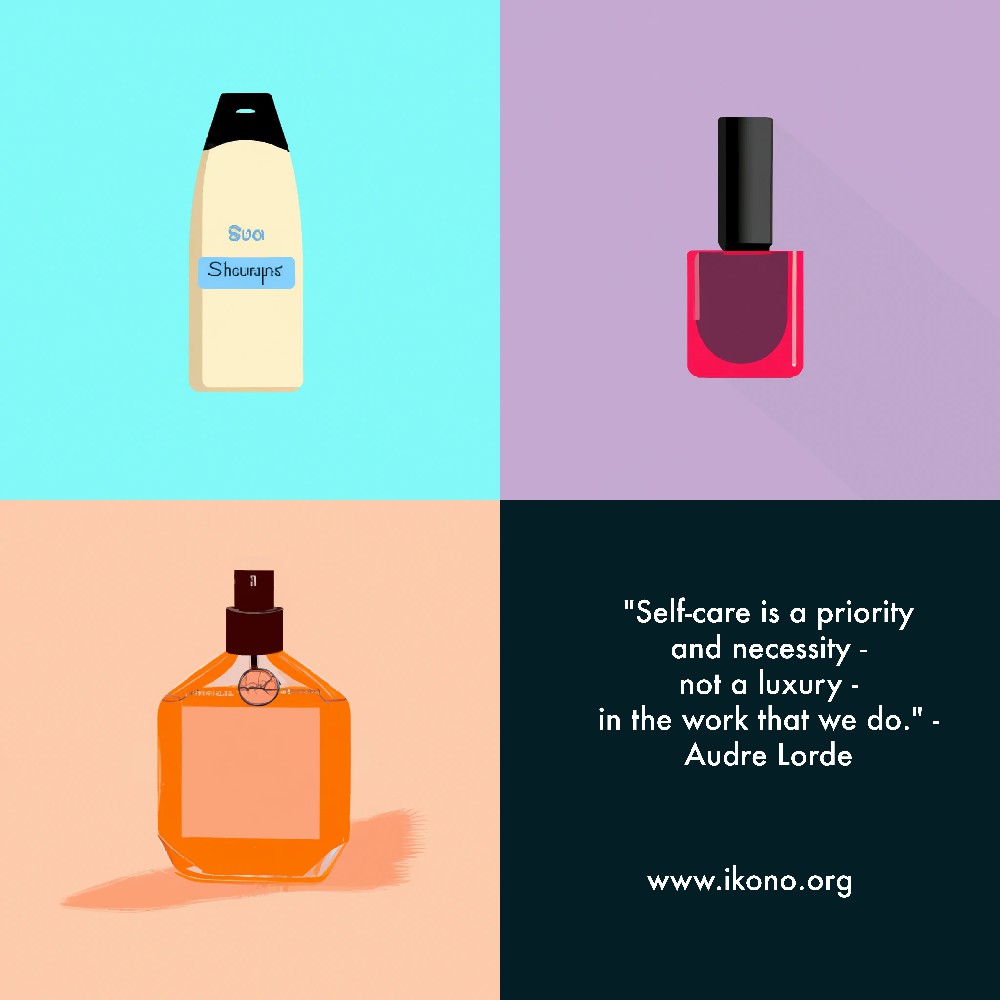
Ikono as the personal care brand agency
In the bustling world of self-care, creating a standout brand requires keen insight, innovative thinking, and a deep understanding of market trends. This is where Ikono, as a leading lifestyle brand agency, truly shines. Ikono’s proficiency in crafting compelling brand narratives, coupled with their global perspective and unique marketing strategies, make them the ideal partner for self-care brands. From conceptualizing distinctive brand identities to executing captivating marketing campaigns, Ikono’s expertise helps self-care brands transcend the ordinary and establish a lasting presence in the minds of consumers.


